高中英语 Unit 1《Festivals around the World》Period5 Using language Extensive reading教案5 新人教版
- 格式:doc
- 大小:76.50 KB
- 文档页数:7
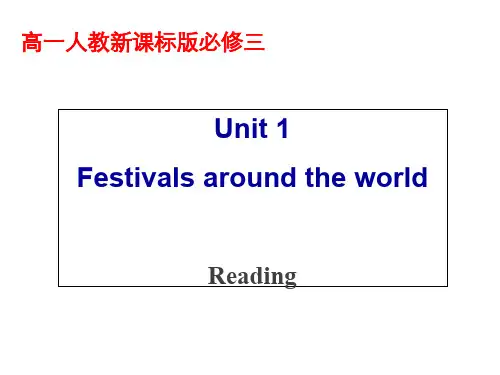
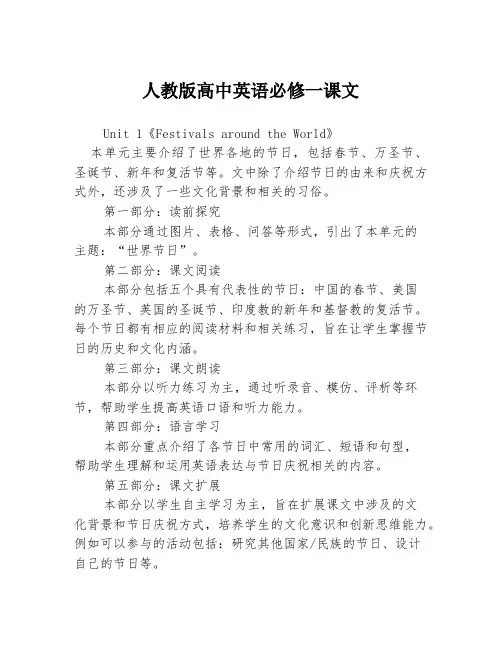
人教版高中英语必修一课文
Unit 1《Festivals around the World》
本单元主要介绍了世界各地的节日,包括春节、万圣节、圣诞节、新年和复活节等。
文中除了介绍节日的由来和庆祝方式外,还涉及了一些文化背景和相关的习俗。
第一部分:读前探究
本部分通过图片、表格、问答等形式,引出了本单元的
主题:“世界节日”。
第二部分:课文阅读
本部分包括五个具有代表性的节日:中国的春节、美国
的万圣节、英国的圣诞节、印度教的新年和基督教的复活节。
每个节日都有相应的阅读材料和相关练习,旨在让学生掌握节日的历史和文化内涵。
第三部分:课文朗读
本部分以听力练习为主,通过听录音、模仿、评析等环节,帮助学生提高英语口语和听力能力。
第四部分:语言学习
本部分重点介绍了各节日中常用的词汇、短语和句型,
帮助学生理解和运用英语表达与节日庆祝相关的内容。
第五部分:课文扩展
本部分以学生自主学习为主,旨在扩展课文中涉及的文
化背景和节日庆祝方式,培养学生的文化意识和创新思维能力。
例如可以参与的活动包括:研究其他国家/民族的节日、设计
自己的节日等。
第六部分:写作训练
本部分通过例句分析和提供写作范文等方式,引导学生掌握如何用英语表达关于节日庆祝的内容,提高写作能力。
第七部分:文化背景
本部分重点介绍了各节日的文化背景和相关的习俗、传统,帮助学生加深对节日的认识和理解。
第八部分:单元测试
本部分为本单元的测试部分,主要包括听力测试、阅读理解和写作。
旨在检验学生对所学知识点的掌握情况,并为学生未来的学习提供参考。
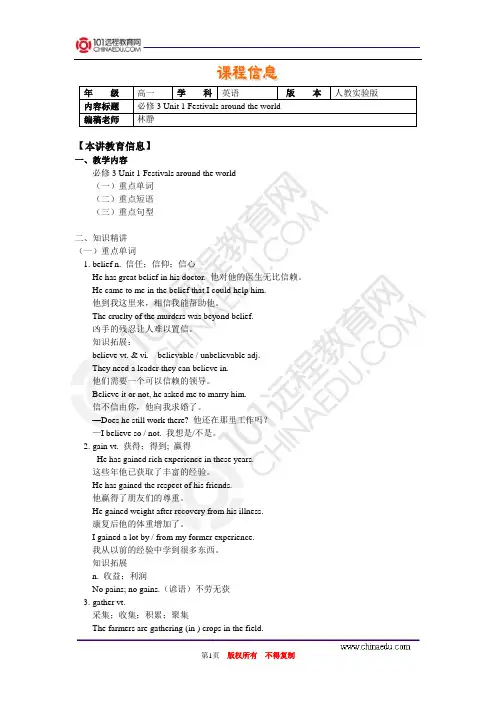
【本讲教育信息】一、教学内容必修3 Unit 1 Festivals around the world(一)重点单词(二)重点短语(三)重点句型二、知识精讲(一)重点单词1. belief n. 信任;信仰;信心He has great belief in his doctor. 他对他的医生无比信赖。
He came to me in the belief that I could help him.他到我这里来,相信我能帮助他。
The cruelty of the murders was beyond belief.凶手的残忍让人难以置信。
知识拓展:believe vt. & vi. believable / unbelievable adj.They need a leader they can believe in.他们需要一个可以信赖的领导。
Believe it or not, he asked me to marry him.信不信由你,他向我求婚了。
—Does he still work there? 他还在那里工作吗?—I believe so / not. 我想是/不是。
2. gain vt. 获得;得到; 赢得He has gained rich experience in these years.这些年他已获取了丰富的经验。
He has gained the respect of his friends.他赢得了朋友们的尊重。
He gained weight after recovery from his illness.康复后他的体重增加了。
I gained a lot by / from my former experience.我从以前的经验中学到很多东西。
知识拓展n. 收益;利润No pains; no gains.(谚语)不劳无获3. gather vt.采集;收集;积累;聚集The farmers are gathering (in ) crops in the field.农民们正在田野里收割庄稼。
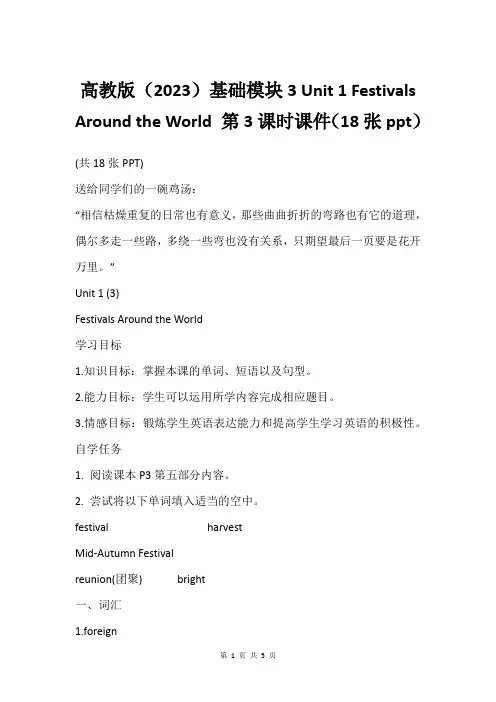
高教版(2023)基础模块3 Unit 1 Festivals Around the World 第3课时课件(18张ppt)(共18张PPT)送给同学们的一碗鸡汤:“相信枯燥重复的日常也有意义,那些曲曲折折的弯路也有它的道理,偶尔多走一些路,多绕一些弯也没有关系,只期望最后一页要是花开万里。
”Unit 1 (3)Festivals Around the World学习目标1.知识目标:掌握本课的单词、短语以及句型。
2.能力目标:学生可以运用所学内容完成相应题目。
3.情感目标:锻炼学生英语表达能力和提高学生学习英语的积极性。
自学任务1. 阅读课本P3第五部分内容。
2. 尝试将以下单词填入适当的空中。
festival harvestMid-Autumn Festivalreunion(团聚) bright一、词汇1.foreignadj.外国的,外来的foreigner【C】n. 外国人,外来人练习造句:他是一名外国学生。
2. vocation n.职业,工作vocational adj. 职业的,职业技术的vocational school:职业学校例:我在一所职业学校上学。
vacation n.假期v.度假summer vacation 暑假winter vacation 寒假go on vacation: 去度假例:我计划暑假去海南度假。
句子练习:1.她是一名职业学校的学生。
2.他的职业是一名警察。
He chose teaching as his _________ vocational B. vocationC. vacationD. vacational3. celebrate v. 庆祝,赞美celebration n. 庆祝,颂扬We had a________ in the hall yesterday.celebrated B. celebrateC. celebratesD. celebration4.familyfamily :“家人” ,不可数名词。
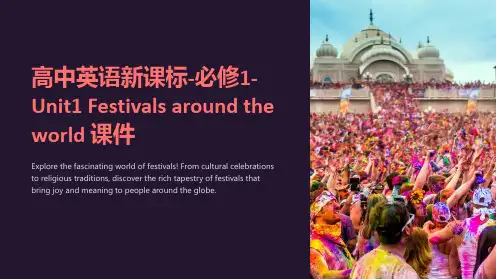
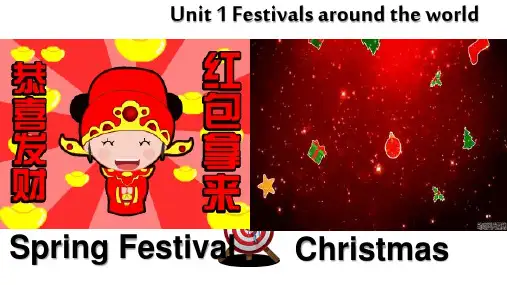
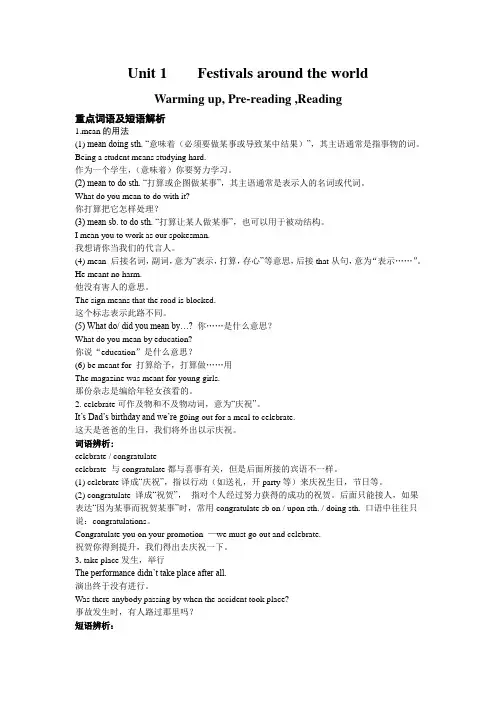
Unit 1 Festivals around the worldWarming up, Pre-reading ,Reading重点词语及短语解析1.mean的用法(1) mean doing sth. “意味着(必须要做某事或导致某中结果)”,其主语通常是指事物的词。
Being a student means studying hard.作为一个学生,(意味着)你要努力学习。
(2) mean to do sth. “打算或企图做某事”,其主语通常是表示人的名词或代词。
What do you mean to do with it?你打算把它怎样处理?(3) mean sb. to do sth. “打算让某人做某事”,也可以用于被动结构。
I mean you to work as our spokesman.我想请你当我们的代言人。
(4) mean 后接名词,副词,意为“表示,打算,存心”等意思,后接that从句,意为“表示……”。
He meant no harm.他没有害人的意思。
The sign means that the road is blocked.这个标志表示此路不同。
(5) What do/ did you mean by…? 你……是什么意思?What do you mean by education?你说“education”是什么意思?(6) be meant for 打算给予,打算做……用The magazine was meant for young girls.那份杂志是编给年轻女孩看的。
2. celebrate可作及物和不及物动词,意为“庆祝”。
It’s Dad’s birthday and we’re go ing out for a meal to celebrate.这天是爸爸的生日,我们将外出以示庆祝。
词语辨析:celebrate / congratulatecelebrate 与congratulate都与喜事有关,但是后面所接的宾语不一样。
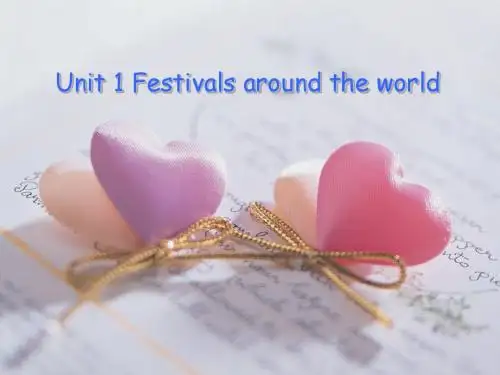
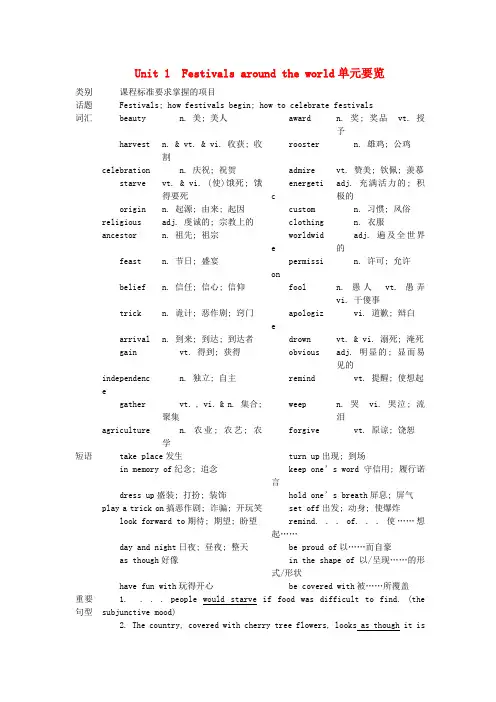
Unit 1 Festivals around the world单元要览类别课程标准要求掌握的项目话题Festivals; how festivals begin; how to celebrate festivals词汇beauty n. 美; 美人award n. 奖; 奖品vt. 授予harvest n. & vt. & vi. 收获; 收割rooster n. 雄鸡; 公鸡celebration n. 庆祝; 祝贺admire vt. 赞美; 钦佩; 羡慕starve vt. & vi. (使)饿死; 饿得要死energeticadj. 充满活力的; 积极的origin n. 起源; 由来; 起因custom n. 习惯; 风俗religious adj. 虔诚的; 宗教上的clothing n. 衣服ancestor n. 祖先; 祖宗worldwideadj. 遍及全世界的feast n. 节日; 盛宴permissionn. 许可; 允许belief n. 信任; 信心; 信仰fool n. 愚人vt. 愚弄vi. 干傻事trick n. 诡计; 恶作剧; 窍门apologizevi. 道歉; 辩白arrival n. 到来; 到达; 到达者drown vt. & vi. 溺死; 淹死gain vt. 得到; 获得obvious adj. 明显的; 显而易见的independencen. 独立; 自主remind vt. 提醒; 使想起gather vt. , vi. & n. 集合;聚集weep n. 哭vi. 哭泣; 流泪agriculture n. 农业; 农艺; 农学forgive vt. 原谅; 饶恕短语take place发生turn up出现; 到场in memory of纪念; 追念keep one’s word守信用; 履行诺言dress up盛装; 打扮; 装饰hold one’s breath屏息; 屏气play a trick on搞恶作剧; 诈骗; 开玩笑set off出发; 动身; 使爆炸look forward to期待; 期望; 盼望remind. . . of. . . 使……想起……day and night日夜; 昼夜; 整天be proud of以……而自豪as though好像in the shape of以/呈现……的形式/形状have fun with玩得开心be covered with被……所覆盖重要句型1. . . . people would starve if food was difficult to find. (the subjunctive mood)2. The country, covered with cherry tree flowers, looks as though it iscovered with pink snow. (as though. . . )3. Finding that. . . , her grandmother finally decided. . . (the presentparticiple used as adverbial. )4. It was obvious that the manager of the coffee shop was waiting. . .(It is+adj. +that. . . )5. “. . . I don’t want them to remind me of her. ” So he did. (So+S.+do/does/did. )6. There was Hu Jin waving at him and calling, . . . (Inversion)功能 1. Making phone callsMay I speak to. . . ?Can I ring/call back later?Hold/Hang on, please.I’ll ring him/her up again.Just a moment, please.Sorry, he/she isn’t here right now.2. InvitationsI wonder if you are interested in. . . .I’d like to invite you to. . . .Would you like. . . ?Could/Would you please. . . ?I’m looking forward to. . . .I’d love to, but. . . .3. ThanksThank you so much.Thanks a lot.That’s very kind of you.You’re most welcome.Don’t mention it.It’s a pleasure.语法The use of can, could, may, might, will, would, shall, should, must, can’t1. can and couldJin can speak English well. (ability)Could you please show me the way to Beihai Park? (request)2. may and mightMay we see the awards for the teams? (permission; request)She might give you some new clothing. (possibility)3. will and wouldThe Spring Festival is the most fun. The whole family will come for dinner.(promise; agreement)Often he would dress up like a rich man. (past habit; custom)4. shall and shouldThe harvest festival begins on Sunday. We shall be there with our friends.(promise; agreement)You should arrive at the airport two hours before he goes. (advice)5. must and can’tWang Feng wins an award every year. He must be very strong. (speculation) You must be joking. That can’t be true. (guessing)教学重点1. Get students to know about festivals around the world.2. Have students learn some useful new words and expressions about festivals and customs and let them learn effective ways to remember English vocabulary.3. Enable students to grasp and use the expressions of request and thanks.4. Let students learn the new grammar item: the use of can, could, may, might, will, would, shall, should, must and can’t.5. Develop students’ listening, speaking, reading and writing abilities.教学难点1. Enable students to master the use of can, could, may, might, will, would, shall, should, must and can’t.2. Let students learn to write a different ending of a story.3. Develop students’ integrative skills.课时安排Periods needed: 7Period 1 Warming up and readingPeriod 2 Learning about language: Important language points Period 3 Learning about language: GrammarPeriod 4 Using language: Listening and speakingPeriod 5 Using language: Extensive readingPeriod 6 Using language: Speaking and writingPeriod 7 Revision: Summing up and learning tipPeriod 1 Warming up and reading整体设计教材分析This is the first teaching period of this unit. At the beginning of the class, the teacher can lead in the topic of the unit by having a free talk with students about their winter holidays and the Spring Festival.The Warming Up is intended to have students start thinking about the variety of events and festivals that are celebrated in China, and connect them with seasons of the year and reasons for the celebrations. The teacher can use this part to introdu ce information that Chinese students should have about their country’s cultural events.The Pre-reading is a continuation of the Warming Up and it moves the discussion to a more personal level. It is intended to help students enter imaginatively into a discussion of festivals and their importance to the society. It also directs their attention to the variety of events and activities those festivals include. The teacher should let students discuss the questions and predict what kind of information will be introduced in the Reading.The reading passage titled FESTIVALS AND CELEBRATIONS briefly describes the earliest kinds of festivals with the reasons for them, and then four different kindsof festivals that occur in most parts of the world. Encourage students to look at the pictures and the heading of each section to guess what the text might be about. Then let them skim for the general idea for each section, and scan for further understanding. Because this passage introduces a lot of useful new words and expressions which are only used for festivals, in order not to let students feel much difficult, the teacher should deal with any language problems while they are reading. After reading, students are required to do the four exercises in the Comprehending to see how much they have understood the reading passage. The teacher can first let them work in pairs or in groups to find the answers cooperatively, and then check their answers with the whole class.To consolidate the contents of the reading passage, students should be required to talk about festivals in their own words at the end of the class. In order to arouse students’ interest, the teacher can hold a competition between groups.教学重点1. Let students learn more about history and basic knowledge of festivals.2. Get students to learn different reading skills.教学难点1. Develop students’ reading ability.2. Enable students to talk about festivals and celebrations.三维目标知识目标1. Get students to learn the useful new words and expressions in this part: beauty, harvest, starve, origin, religious, ancestor, Mexico, feast, bone, belief, poet, arrival, gain, independence, gather, agriculture, award, rooster, admire, energetic, Easter, clothing, Christian, custom, take place, in memory of, dress up, play a trick on, look forward to, day and night, as though, have fun with2. Let students learn about history and basic knowledge of festivals both in and out of China.能力目标1. Develop students’ reading ability and let them learn different reading skills.2. Enable students to talk about festivals and celebrations.情感目标1. Stimulate students’ love for their own national culture and customs.2. Develop students’ sense of cooperative learning.教学过程设计方案(一)→Step 1 Leading-inHave a free talk with students. Ask them the following questions:Did you have a good time in your winter holidays?When did you feel most happy and excited? Why?(At the Spring Festival. Because it’s the most important festival in ourcountry. . . )→Step 2 Warming up1. Let students brainstorm the other Chinese festivals.(Lantern Festival, Pure Brightness Festival, Dragon Boat Festival, Mid-Autumn Festival, New Year’s Day, Chung Yeung Festival. . . )2. Let students read the information about Chinese festivals below and discuss another three Chinese festivals:When does the festival come?What do people celebrate?What do people do?Festivals Date Festivals DateNew Year January 1st Teachers’ Day September 10th InternationalWomen’s DayMarch 8th National Day October 1stArbor Day March 12th The Spring Festival Lunar New YearInternational Labor Day May 1st Dragon BoatFestivalthe fifth day of the fifthlunar monthInternational Children’s Day June 1st Mid-AutumnFestivalthe 15th day of the 8thlunar monthArmy Day August 1st Lantern Festival the 15th day of the 1stlunar monthChinese Youth Day May 4th Pure Brightness Day April the fifth3. Ask students to fill in the following form and ask some to share their opinions with the whole class. The first one is given as an example.Festivals Time of year/date What it celebrates What people doMid-Autumn Festival autumn/fall the beauty of thefull moon, harvest,time with familyand friendsgive/eat moon cakesand watch the fullmoon with familyand friends4. Talk about some foreign festivals with students.(Christmas, April Fools’ Day, Easter, Halloween, Valentine’s Day, Thanksgiving Day, . . . )→Step 3 Pre-reading1. Let students discuss the following questions:What festivals or celebrations do you have in your city or town? What part of a festival do you like best—the activities, the music, the sights, the food or the people who visit?2. Ask students to look at the pictures and title of the passage in Reading. Discuss in pairs what kind of information will be introduced in the passage.→Step 4 Reading1. Fast readingAsk students to skim the reading passage and then fill in the following chart.Kinds of Festivals Names of Festivals Countries FestivalsFestivalsHarvestSpring(Let students look through the chart and then read the text silently. Three minutes later, check the answers with the whole class. Show the suggested answers on the screen. )2. Intensive readingAllow students to read carefully this time to understand the main ideas of each paragraph and the important details, and then finish the following:1)Choose the best answer to each question or to finish each sentence according to the text.(1)Why do Japanese people light lamps during the Festival of the Dead?A. Because they want to make the festival colorful.B. Because they want to light up their rooms.C. Because they want to light up their way.D. Because they want to lead their ancestors to return to earth.(2)Which of the following was not mentioned as a famous person in the text?A. Mohandas Gandi.B. Christopher Columbus.C. Abraham Lincoln.D. Qu Yuan.(3)The place where people will usually decorate churches and town halls with flowers and fruits is ______________.A. IndiaB. AmericaC. EuropeD. China(4)Easter is held in memory of the return of Jesus for Christians and also celebrates ______________.A. the coming of springB. the autumn harvestC. the Lunar New YearD. the end of a yearSuggested answers: (1)D (2)C (3)C (4)A2)Use the information from the reading passage to answer the following questions.(1)What are festivals of the dead usually for?(2)What makes autumn festivals happy events?(3)What do people usually do at spring festivals?(4)What is one important reason to have festivals and celebrations?(5)Compare the festivals of the dead in Mexico, Japan and China. What things are similar? What things are different?3. Reading and discussionRead the text a third time and then work in pairs to do the following.1)Based on the reading passage, what do most festivals seem to have in common? Why do you think these things might be important to people everywhere? Talk with your partner and fill in the chart below.Three common things Reasons why they are important to people everywhere1.2.3.2)Discuss in pairs which festivals you think are the most important and which are the most fun. Then fill in the chart with your ideas.Type of festival Example of festival Reasons for yourchoiceMost importantMost fun(Let students have enough time to read the passage carefully and discuss the questions and charts with their partners. Encourage them to expand their answers according to their own experiences. )4. ExplanationHelp students analyze some difficult, long and complex sentences and guess the meanings of some new words. Encourage them to try to deal with the language points in the context.Discuss the following important sentences and phrases in the passage.1)Some festivals are held to honour the dead, or to satisfy the ancestors, who might return either to help or to do harm.2)in memory of3)India has a national festival on October 2 to honour Mohandas Gandhi, the leader who helped gain India’s independence from Britain.4)People are grateful because their food is gathered for the winter and the agricultural work is over.5)The most energetic and important festivals are the ones that look forward to the end of winter and to the coming of spring.6)The country, covered with cherry tree flowers, looks as though it is covered with pink snow.Suggested explanations:1)The sentence contains a non-restrictive attributive clause who might return either to help or to do harm. It means people hold some festivals either to show respect to the dead or to make their ancestors happy in case they might come back to do harm.2)in memory of: serving to recall sb. , to keep him fresh in people’s mindsHe wrote a poem in memory of his dearest wife, who died in an accident.in honor of: showing great respect or high public regard3)the leader who helped gain India’s independence from Britain: a noun phrase followed by an attributive clause as the appositive4)two clauses for reason5)energy n. → energetic adj. : full of or done with energylook forward to: “to” is a preposition here.I’m looking forward to hearing from you.be devoted to; be/get used to; get down to; stick to. . .6)covered with cherry tree flowers: a past participle phrase equal to “which is covered with cherry tree flowers”as though: as ifHe talks as though he knew all about it.He looks as if he had seen a ghost.5. Reading aloud and underliningAsk students to read the passage aloud to the tape and let them pay attention to the pronunciation of each new word and the pauses within each sentence. Tell them to pick out all the useful expressions or collocations from the passage while reading and copy them to the notebook after class as homework.→Step 5 ConsolidationAsk students to talk about festivals in their own words according to the text. Then let them complete the following passage with proper words or phrases.There are all kinds of festivals and ______________ around the world, which are held for different ______________. The ancient festivals were mainly held at three times a year—the end of the cold ______________, planting in spring and ______________ in autumn. Some festivals are held to ______________ the dead or ______________ the ancestors, who might return either to help or ______________, while other festivals are held to honor famous people or to the ______________, such as Dragon Boat Festival, Columbus Day, and so on. Harvest and ______________ festivals are happy events because their food is ______________ for the winter and the ______________ work is over, to which Mid Autumn Festival belongs. And the most ______________ and important festivals are the ones that ______________ the end of winter and to the coming of ______________ such as the Lunar New Year, at which people have a very ______________.Suggested answers: celebrations; reasons; weather; harvest; honor; to satisfy; to do harm; gods; Thanksgiving; gathered; agricultural; energetic; look forward to; spring; good time→Step 6 Homework1. Learn the useful new words and expressions in this part by heart.2. Read the reading passage again and again and try to talk about festivals both in and out of China.设计方案(二)→Step 1 Leading in the topic by learning vocabulary about festivals1. Make a circle on the blackboard and write the word “FESTIVAL” in it.2. Ask students, “We have learned ‘festival’. Can you name some festivals? ”3. Students list as many festivals as possible. Then the teacher adds somestudents can’t think of, such as Halloween, Easter, Thanksgiving, Valentine’s Day.4. Let students read them aloud and try to learn them by heart.→Step 2 Warming up by talking about festivalsWork in groups and list three more Chinese festivals that you know. Discuss when they take place, what they celebrate and what people do at that time. Then tell the group which festival is their favorite and why.Festivals Time of year/date What it celebrates What people doMid-Autumn Festival autumn/fall the beauty of thefull moon, harvest,time with familyand friendsgive/eat moon cakesand watch the fullmoon with familyand friends→Step 3 Predicting by looking and discussing1. Look at the pictures and title of the reading passage and discuss in pairs what the passage might be about.2. Two or three students are to give their opinions.→Step 4 Reading1. Give students 2 minutes, and ask them to skim the passage for information to tell if the following sentences are True or False.1)The ancient people needn’t worry about their food. (F)2)Halloween used to be a festival intended to honor the dead. (T)3)Qu Yuan was a great poet who people honor a lot in China. (T)4)The Mid-autumn Festival is held to celebrate the end of autumn. (F)5)Easter celebrates the birth of Jesus. (F)2. Give students 5 minutes to read the passage carefully, and complete the chart according to the passage.Festivals of the Dead Obon in Japan___________________HalloweenFestivals to Honor People ________________________________A national festival in____________ Harvest Festivals _________ in European countries_________ in China and Japan Spring Festivals ________________Carnivals in some Western countries________________________________ in Japan3. Listening and reading aloudPlay the tape of the text for students and let them pay attention to the pronunciation of each new word and the pauses within each sentence. Then ask them to read the text aloud to the tape.→Step 5 Closing down by spoken practice1. Have students get prepared in 3 minutes or so and then ask them to talk about festivals and celebrations.2. Ask as many students as possible to have a try in front of the class.→Step 6 Homework1. Go over the text and try to learn all the useful words and expressions in this part by heart.2. Finish the exercises in Comprehending on Page3.板书设计Unit 1 Festivals around the worldFestivals and celebrationsKinds of Festivals Names of Festivals Countries FestivalsFestivalsHarvestSpring活动与探究Group discussion & speechAs is known from the reading passage, festivals of all kinds are celebrated around the world. Most festivals have celebrations that include food, music, clothing and dances. These events originated from some similar ideas, but they take different forms in different regions and societies. What festivals and celebrations do you know all over the world? Have you ever taken part in them and enjoyed yourself? Discuss festivals in groups and then make speeches.Step 1: The teacher divides the class into four groups and gives the tasks to students in each group. Group 1 will list the festivals around the world as many as possible, and then categorize them according to the origins of these festivals. And they should prepare for a short speech. Group 2 will discuss two traditional Chinese festivals and prepare for their presentation. Group 3 will discuss two Western festivals and prepare for their presentation. Group 4 will discuss the differences between Chinese festivals and Western festivals, then contrast and compare their styles, celebrations, dates and so on. And they should prepare for a short speech.Step 2: Groups 1, 2 and 3 give their speeches on the festivals they have discussed. Group 4 gives their speech on the differences between Chinese festivals and Western festivals.Step 3: The teacher makes proper remarks about students’ speeches and sums up the different cultural practices between China and other countries according to them.。
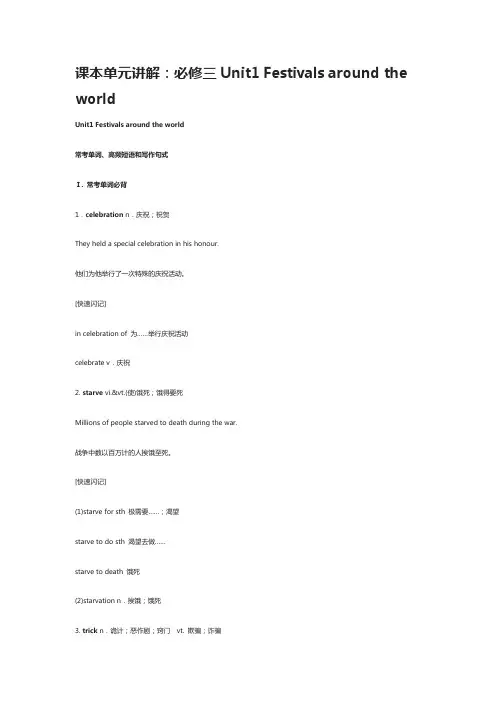
课本单元讲解:必修三Unit1 Festivals around the worldUnit1 Festivals around the world常考单词、高频短语和写作句式Ⅰ. 常考单词必背1.celebration n.庆祝;祝贺They held a special celebration in his honour.他们为他举行了一次特殊的庆祝活动。
[快速闪记]in celebration of 为……举行庆祝活动celebrate v.庆祝2. starve vi.&vt.(使)饿死;饿得要死Millions of people starved to death during the war.战争中数以百万计的人挨饿至死。
[快速闪记](1)starve for sth 极需要……;渴望starve to do sth 渴望去做……starve to death 饿死(2)starvation n.挨饿;饿死3. trick n.诡计;恶作剧;窍门vt. 欺骗;诈骗A clever lawyer should be able to trick the prisoner into an admission of guilt.聪明的律师应能诱使罪犯认罪。
[快速闪记]trick sb into (doing) sth 诱使某人做某事trick sb out of sth 从某人处骗取……4. award n.奖;奖品vt. 授予;判定He won the first awards of many English contests.他获得过许多英语比赛的一等奖。
The school awarded Mary a prize for her good work.学校因为玛丽的出色表现而奖励了她。
5. admire vt. 赞美;钦佩;羡慕I admire him for his success in business.我钦佩他事业有成。
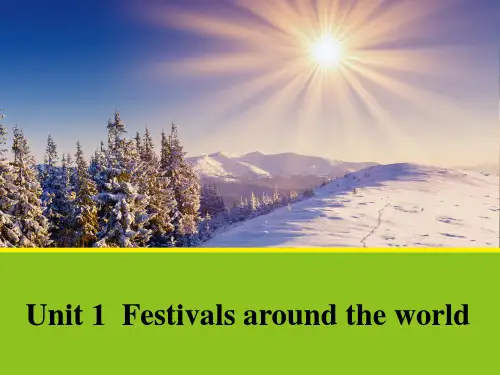
Unit 1 Festivals around the worldPeriod 5 Using language: Extensive reading整体设计教材分析This is the fifth teaching period of this unit. As usual, the teacher should check students’ homework and offer chances for them to go over what they learned in the last period at the beginning of the class. Then lead in the new lesson.In this period, the teaching emphasis will be put on developing students’ reading ability by reading extensively. We will deal with two articles: A Sad Love Story in Using language on Page 7 and Winter Carnival in Quebec in Reading task on Page 44. While reading, get students learning to use some reading strategies such as skimming, scanning, and so on. As to new words and phrases, the teacher can first find those students feel most diffi cult and help them to understand. That’s enough here. The purpose of A Sad Love Story is to introduce a cross-cultural view of lovers’ festivals—Qiqiao Festival and Valentine’s Day. It is set in a present-day context that students can relate to, and respond to. The teacher can first talk about the famous Chinese sad love story of Zhinu and Niulang to lead in the topic and then ask students to read the passage and do some comprehending exercises. While checking their answers with the whole class, deal with l anguage problems students can’t work out by themselves. This is an extensive reading lesson, so the teaching steps should be simple. As to the part Reading task, its purpose is to introduce students to the Winter Carnival in Quebec, and to further their understanding of the reasons that people need to have festivals and what is done at them. Ask students to read through the passage and learn more about the foreign festival and its customs.At the end of the class, ask students to retell the two passages. In order to arouse students’ interest, the teacher can hold a competition between them.教学重点1. Develop students’ reading skills by extensive reading.2. Let students read and understand the two passages.教学难点1. Enable students to learn to use reading strategies such as skimming, scanning, and so on.2. Get students to understand foreign culture and customs.三维目标知识目标1. Get students to learn some useful new words and expressions in this part: apologize, drown, sadness, wipe, weep, remind, forgive, turn up, keep one’s word, hold one’s breath, set off, remind. . . of. . .2. Get students to read the story A Sad Love Story.3. Let students know more about the Quebec Carnival.能力目标1. Develop students’ reading skills by extensive reading and enable them to learn how to use different reading skills to read different reading materials.2. Enable students to tell about Qiqiao Festival and Valentine’s Day.3. Let students tell about the Quebec carnival with their own words.情感目标1. Stimulate students’ love of Chinese festivals and culture by learning foreign culture and custom.2. Develop students’ sense of group cooperation and teamwork.教学过程设计方案(一)→Step 1 Revision1. Check the homework exercises.2. Ask some pairs of students to come to the front and act out their dialogues to review and practice the expressions for requests and thanks.→Step 2 Warming up by brainstormingCan you tell something about Chinese Qiqiao Festival?Can you tell something about Valentine’s Day?Have you read any love stories? What are they?→Step 3 Reading1. Reading and judgingAsk students to read the passage fast and then decide whether each of the following statements is true or false.1)The girl Li Fang loved and waited for didn’t turn up, but he didn’t lose heart.2)Because her granddaughter got married to a human, the Goddess of Heaven got very angry.3)Zhinu was made to return to Heaven without her husband. They were not allowed to meet forever.4)Hu Jin had been waiting for Li Fang for a long time with a gift for him.Keys for reference: 1)F 2)T 3)F 4)T2. Reading and answeringAsk students to read the passage carefully, and answer the following questions.1)Why did Li Fang feel like a fool?2)What was Li Fang afraid that Hu Jin was doing?3)How did Li Fang know the manager wanted to shut the coffee shop?4)What is the reason why Li Fang and Hu Jin did not meet on time?5)Why was Li Fang so worried at the end of the story?3. Check the answers with the whole class and deal with any language problems.Keys for reference:1)Li Fang felt like a fool because he thought that he was waiting without any hope. /Hu Jin wouldn’t come to meet him.2)He was afraid that she was with her friends laughing at him.3)The manager wiped the tables, then sat down and turned on the TV.4)They didn’t meet on time be cause Li Fang waited in the coffee shop while Hu Jin in the tea shop.5)He was worried because he had thrown away the roses and chocolates/presents/gifts for Hu Jin and he had nothing to give her and he thought she would not forgive him.4. Reading and findingAsk students to read the passage aloud to the tape and underline all the useful expressions or collocations in the passage. Let students read them aloud and copy them down in their exercise book after class as homework.Collocations: be heart-broken, Valentine’s Day, a coffee shop, after work, turn up, laugh at, keep one’s word, look forward to, hold one’s breath, drown one’s sadness in coffee, the Goddess of Heaven, the weaving girl, on earth, the herd boy, fall in love, get married, be married to, the Milk Way, once a year, be able to, set off, throw. . . away, remind. . . of, . . .→Step 4 Discussion1. After students’ reading the passage, ask them to work in groups and discuss the following questions:1)Why was the TV story what Li Fang needed?2)Why do people want the weather to be fine on Qiqiao Festival?3)What more do you know about Qiqiao Festival?4)Are you satisfied with the ending of the story? If not, how are you going to rewrite it?2. Ask students to start their discussion. Make sure that every student has a chance to express his/her ideas.3. Ask each group to choose one student as their representative. Let as many group representatives as possible come to the front and give a report of what their group has discussed.→Step 5 Reading taskTell students: We have learned some knowledge of festivals around the world from the reading passage Festivals and Celebrations. We have also learned about the Trinidad Carnival. Do you want to know about the Quebec Carnival? Please Turn to Page 44 and read the passage Winter Carnival in Quebec.1. Ask students to read the passage fast to get the general idea.2. Let students read the passage carefully and then answer the following questions.1)Why do you think that dogs are used to pull sleds in cold climates?2)Which activity at the Carnival do you think would be the most fun? Why?3)Which activity at the Carnival do you think would be the most dangerous? Why?4)If you could go to the Quebec Carnival, what would you do or see? Why?5)If you had to draw a poster for the Carnival, what things would you put on the poster?6)What would you wear if you went to the Carnival? Name at least three things.3. Check the answers with the whole class after most of them finish.Keys for reference:1)Dogs are used in cold climates because they can run on top of the snow, which horses cannot/because they have very thick fur which keeps them warm. They are also very strong/do not eat grass and grain as horses and cattle do/can be fed on meat/do not eat too much.2)Students give their own answers.3)Probably the canoe race through the ice would be the most dangerous.4)Students give their own answers.5)Students give their own answers.6)I would wear a warm coat/jacket/hat/gloves/mittens/boots/underwear/scarf/socks.4. Have students compare Harbin with Quebec.1)Talk about Harbin with students.What do you know about Harbin?2)Let students fill in the chart.City Similarity DifferenceHarbinQuebec→Step 6 Important language points1. But she didn’t turn up.可她却不见人影。